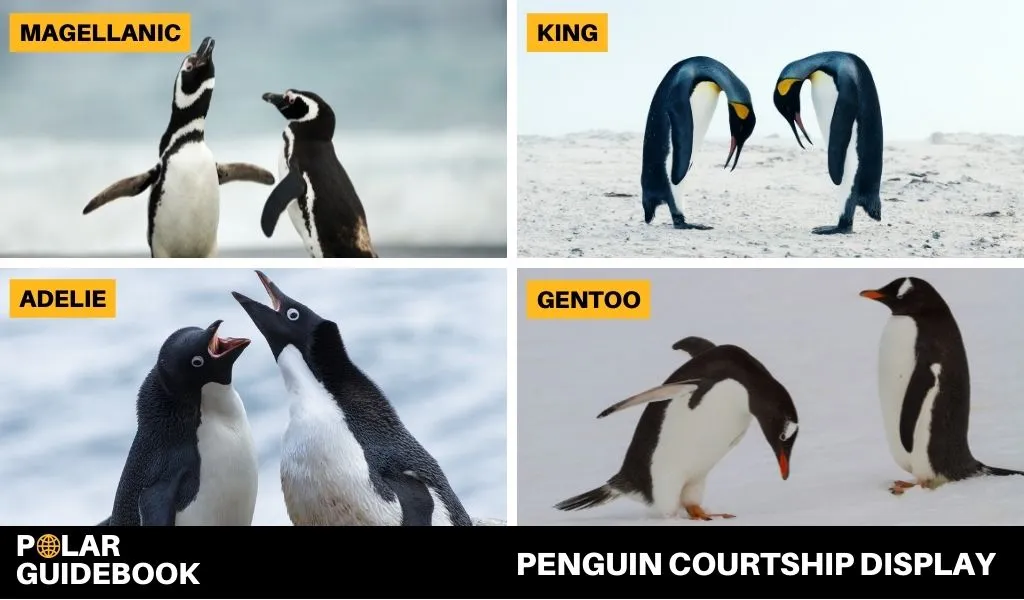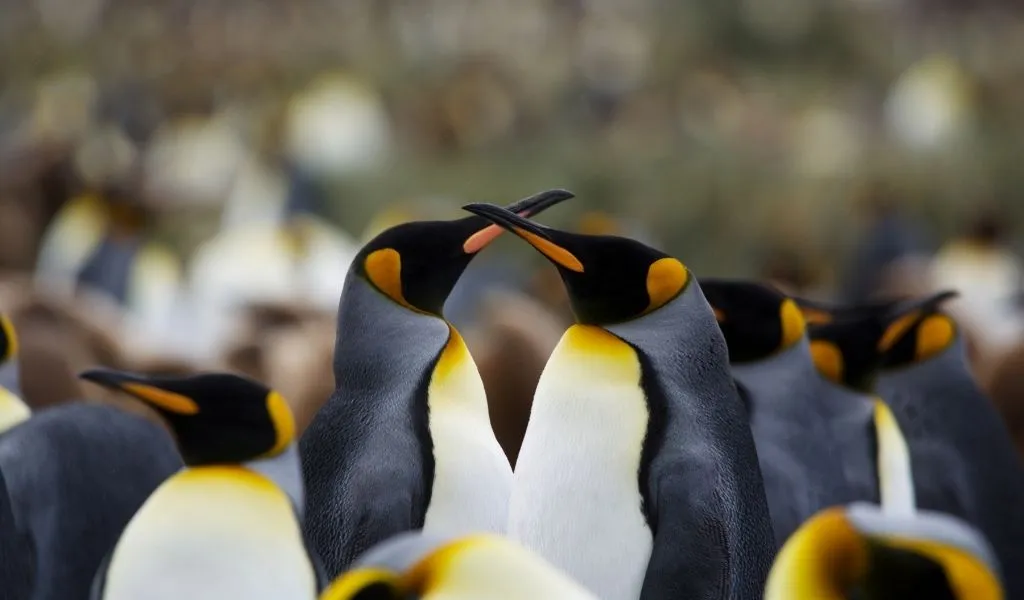If you’ve watched March of the Penguins, you might find that Morgan Freeman’s voice and the endearing background music make it feel much like a human love story. But how much of this has been edited for the big screen? Are penguins monogamous and do they fall in love?
Yes, penguins are monogamous and will stay with one partner for a breeding season. However, they don’t always stay with the same mate for life. Among some species, as many as 85% of penguins will find a new mate the following season and some will engage in extrapair copulation (cheating on their partner).
Keep reading to find out more about monogamy among penguins, how they court one another, and some penguin love facts.
Are Penguins Monogamous?
Yes, penguins are monogamous which means that they will have only one partner per breeding season. Both the male and female will play a role in rearing their offspring.
The number of pairs that remain together for more than one breeding season (known as mate fidelity) will vary between species and often among different colonies of the same species.
The below table breaks down the fidelity of different species of penguin:
| Penguin Species | Fidelity Facts |
|---|---|
| Emperor Penguin | Emperor Penguins have a divorce rate of around 85% which is higher than most other penguin species. Although they only have one partner per breeding cycle, they will have many partners over their lifetime. |
| Adelie Penguin | Usually, around 60-80% of Adelie Penguins will return to the same partner as a previous year. |
| Magellanic Penguin | Mate fidelity of Magellanic Penguins is 86% for males and 83% for females. It has been found that fidelity is highly related to breeding success. Pairs will typically only find a new mate when they have failed to produce offspring. One pair has been recorded mating for 17 consecutive years at Punta Tomba. They are also highly loyal and unlikely to engage in extrapair copulation (cheating on their partner). |
| Fiordland Penguin | Two-thirds of Fiordland penguins reunite with their partner from previous seasons. Pairs that reunite are more likely to successfully produce offspring. |
| Yellow-eyed Penguin | Nearly three-quarters of Yellow-Eyed Penguins remain together for more than one breeding cycle. |
| Macaroni Penguin | The fidelity of Macaroni Penguins is between 71-79% for more than one year and 50% for two years or more. They also tend to use the same nest as a previous year. |
| Galapagos Penguin | Galapagos Penguins have different breeding behavior to other penguins as they can breed at any time of year and up to three times per year. They are monogamous and faithful with a fidelity rate of |
| African Penguin | The fidelity rate at St Croix Island (in the Caribbean) is between 80-92%. |
| Chinstrap Penguin | 82% of surviving pairs will mate again the next year. |
| King Penguin | King Penguins have a low rate of fidelity at 28.6% which is due to not arriving at the molt at the same time as their partner. |
| Gentoo Penguin | Estimates of mate fidelity range from 49% at Crozet Island (Southern Indian Ocean) up to 90% in the South Shetland Islands |
| Little Penguin | The divorce rate of Little Penguins varies across years but is between 0-40%. Little Penguins stay with their partner for between 1-13 years and have between 1-8 mates in their lifetime. |
| Southern Rockhopper Penguin | The fidelity rate of Southern Rockhopper Penguins has been recorded at 50% on Macquarie Island. |
Do Penguins Have the Same Mate for Life?
Watch the video version here, or scroll down to keep reading the rest of the article:
No, penguins do not have the same mate for life. They will usually stay with the same mate for one breeding season, however, there is no guarantee that they will pair up with the same mate again in the next breeding season.
When a penguin pairs with a new mate even though their existing mate is still alive, it is called a divorce. The number of penguins that choose a new breeding partner to the previous season (known as the divorce rate) varies among different species of penguin.
Emperor Penguins have an unusually high divorce rate at 85% and King Penguins are also thought to be just behind them1 (source: Penguins: Natural History and Conservation, 2013). The main reason why Emperor Penguins and King Penguins choose a new mate is due to not arriving at the breeding ground at the same time. In King Penguins, it is especially likely when the female arrives earlier than the male2 (source: J. Bried, The Auk, Vol. 116, Issue 2, 1999).
Chinstrap and Gentoo Penguins are known to have high levels of fidelity, repairing in 82% and 90% of cases respectively. The high fidelity of Gentoo Penguins is explained because they don’t move around much over their breeding range which allows pairs to remain in close association all year-round3 (source: Penguin Biology, 2012).
Among Fiordland Penguins, the female is known to react adversely if they return to find their previous mate with a new partner. There can be fierce fighting which results in the new partner being expelled away4 (source: Penguins: Natural History and Conservation, 2013).
Do Penguins Fall in Love?
Yes, it’s possible that penguins fall in love if we define love as a feeling of affection, although it’s unlikely that they experience romantic love in the same way as humans. The main aim of a penguin relationship is to reproduce and raise offspring.
Penguins are birds and like most bird species, they exhibit many of the same traits as human relationships such as elaborate courting, monogamy, and showing affection for each other.
One of the biggest similarities between penguins and humans is the sharing of parenting duties such as protecting, feeding, and caring for their young. The instinct to care for one’s young is a universal type of love that most animals exhibit from birds to mammals.
Penguins can recognize their mate and for the most part, have a high level of fidelity across breeding seasons.
However, much of the relationship centers around successfully producing offspring and they will typically look for a new mate if breeding is unsuccessful. This suggests that ‘penguin love’ is more about building a family and the benefits of shared parenting than the romantic feelings that humans exhibit.
5 Quick Penguin Love Facts
- Penguins are monogamous because they only have one partner at a time.
ㅤ - Penguins might choose a new partner during the next breeding season, this is known as a penguin divorce.
ㅤ - Penguin divorce rates vary between species, some are highly likely to keep the same partner from year to year, whereas others are not.
ㅤ - Penguins are not always loyal to their partner and may breed with others, but this does not usually result in offspring.
ㅤ - Penguins flirt by performing a display for potential partners with bowing and wing flapping.
How Do Penguins Flirt?
To attract a mate in the first place, some species of penguins will have different colored feathers on the crest of their head or their neck, these are usually golden yellow. Those with the most extravagant crest feathers will be the most attractive5 (source: D.B. Thomas, et al., Journal of the Royal Society, Interface Vol. 10, Issue 83, 2013).
Like most bird species, when penguins are flirting, the males will perform an ecstatic display, also known as a courtship display.
The display varies between species but generally involves a pattern of dipping their head low then stretching it high with their flippers spread out. This will be accompanied with braying or squawking. Some species will also swing their heads from side to side6 (source: Seaworld).
The courtship display is a signal that penguins are establishing a nest site and a warning to other males to stay away. When penguins have found a suitable mate, both males and females perform a mutual ecstatic display in which they stand face to face performing coordinated movements where they will bow and call to one another7 (source: S. Moss, Dynasties, 2018).

The mutual display also differs between species with some flapping their flippers and others rolling their heads from side to side. Emperor Penguins have a unique ritual where they bow their heads with their beaks pointing directly at the ground pointed to the ground while making loud noises.
This happens a lot at the beginning of a pairing as the pair build their bond and also helps learn each other’s call so that they can find one another later8 (source: Live Science).
Why Do Penguins Give Pebbles?
Some male species of penguins returning to the nest will give pebbles to their mate as a courtship gesture. This has been noted among Gentoo Penguins who breed on sub-antarctic islands or the Antarctic peninsular9 (source: BBC).
The gift of a pebble from one mate to another is an acknowledgment of their relationship. The pebble will be used along with other rocks, vegetation, and feathers to build a nest for their new family that will stop the eggs from rolling away10 (source: Seaworld).
It’s likely that Adelie and Chinstrap Penguins do this too as their nests are also made from rocks and pebbles. Other species, such as Emperor and King Penguins, do not give pebbles because they do not build nests.
As well as giving pebbles, researchers also found small stones in their stomachs, see our full article to find out why penguins swallow stones.
What Happens When Penguins Can’t Find Love?
When penguins can’t find a partner in a breeding season, they will remain unmated until the next mating season when they will attempt again to find a mate.
In a study of 75 Galapagos Penguins, five males remained unmated for five breeding seasons but no female that had laid eggs remained unpaired11 (source: P.D. Boersma, An ecological and behavioral study of the Galapagos Penguin, 1976).
Are Penguins Loyal to Their Mate?
No, although penguins are socially monogamous, not all penguin species are loyal to their mate. Some species such as the Humboldt Penguin engage in extrapair copulation which means mating with another who is not their partner.
This is an often-misunderstood fact about penguins as monogamy does not necessarily mean loyal.
In a study of Humboldt Penguins in Peru, researchers found that 19.2% of males and 30.7% of females engaged in extrapair copulations. Male extrapair copulation always took place at the nest, whereas 92% of female copulation was away from the nest12 (source: M.K. Schwartz, et al., Behavioral Ecology, Vol. 10, Issue 3, 1999). However, none of these resulted in additional offspring.
Among Little Penguins, endemic to Australia and New Zealand, extrapair copulation is very common. Some Little Penguins have been recorded having up to four partners in one day.
In as many as a third of cases, female Little Penguins have been recorded in the burrow with another male before laying their egg, so the real father may be unknown13 (source: A. Chiaradia, Little Penguins: creatures of the night, 2001). This is not surprising given that Little Penguins have the shortest lifespan so they have less time to produce offspring.
However, being disloyal is just the tip of the iceberg (excuse the penguin joke). In documents unearthed from Antarctic expeditions in the early 20th century, it was discovered that Adelie Penguins engage in aberrant sexual behavior, including necrophilia and sexual coercion14 (source: The Guardian).
Related Questions
Do Penguins Stay Single if their Partner Dies?
No, when a penguin’s partner dies or does not return to the same breeding ground, they will look for a new mate to produce offspring with.
How Do Penguins Show Affection?
As penguins cannot kiss due to their long beaks, they are known to show affection for one another by rubbing their beaks or bodies together. This also generates much-needed body heat among penguins that live in colder regions.




![Read more about the article How Do Penguins Swim and Dive So Well? [and Other Questions]](https://polarguidebook.com/wp-content/uploads/2022/01/How-do-penguins-swim-so-well-300x176.jpg)